Header 1
Università degli Studi di Brescia

The University of Brescia was established in 1982.
map
body
The University of Brescia was established in 1982. It offers a wide range of educational programs with Bachelor and Master of Science (MSc) degrees, postgraduate technical courses, specializations, and Ph.D. programs in most areas of business and economics, engineering and technology, law, medicine and surgery, dentistry. With its more than 600 permanent academic staff, it offers 26 undergraduate degree programs, 16 postgraduate, 5 Single Cycle Master's Degree Programs, 41 Schools of specialization and 9 Doctoral Degree programs. The student population is currently about 17000 members.
The University of Brescia aims to enhance research and address the educational needs of the European and global communities by promoting collaboration and integration. The University of Brescia promotes initiatives aimed at internationalization, European and international exchange, and cooperation programs to encourage student and researcher mobility. Therefore, it has a wide choice of dual award programs, courses taught in English, international summer schools, together with highly recognized scientific research and important international awards. UNIBS participated in various programs such as FP5, FP6, FP7, Horizon 2020, Horizon Europe, COST actions, LIFE+, Southeast Europe Program, Erasmus Mundus, ACP Water Facility, and Civil Justice.
The AI Planning (AIP) Group in Brescia University is led by Professor Alfonso Emilio Gerevini and involves 6 researchers. The AIP group is well known in the Artificial Intelligence research community for its strong theoretical and practical contributions to the field of Automated Planning and scheduling and applied machine learning. The group has a consolidated track record in the more prestigious AI international conferences (ICAPS, IJCAI, AAAI, ECAI) and Journals (AIJ, JAIR), with h-index spanning from 8 to 31. The group carries ethtical research on a number of topics such as classical planning, heuristic search for planning, planning as satisfiability and compilation approaches, learning for planning, configurable and portfolio-based planning, case-based planning, partial-order planning, multi-agent distributed planning, planning with preferences and soft goals, planning with state trajectory constraints and temporally extended goals, temporal and numeric planning, hybrid (HTN+PDDL) planning, plan revision and adaptation, plan execution and monitoring, path planning, planning languages and knowledge representation, agent-behavior modeling, automatic domain analysis tools, interactive planning and plan visualization, agent-behavior modeling. The group is also known for the active and successful participation in a number of International Planning Competitions and for the development and the maintenance of a variety of automated planning systems that are currently used by a large number of AI researchers (LPG, ENHSP, PBP, CPCES, SPRINGROLL). Some of the planning systems developed by the team have obtained international awards for top performance (i.e., LPG, LPG-td, PBP.s, PbP.q, PbP2). This is one of the leading Italian groups in the AI panorama, and it has close collaborations with many international advanced research groups, the “Spedali Civili” of Brescia Hospital and different SMEs enterprises.
Piazza del Mercato, 15
25121 Brescia BS
Italy